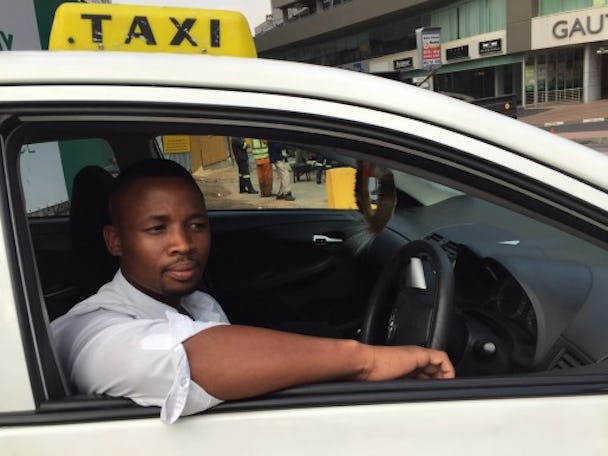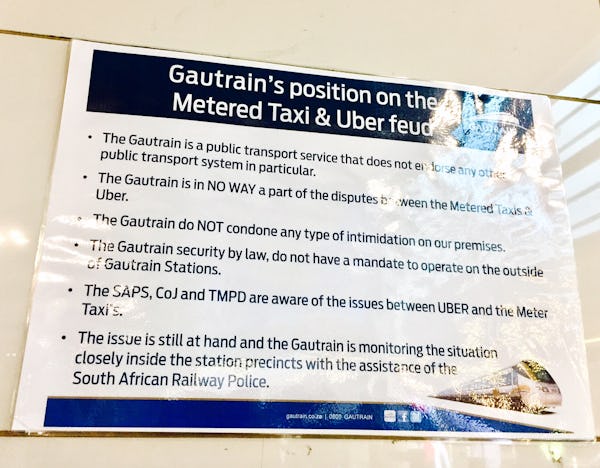Lives will be lost
Johannesburg. The escalating competition between taxi companies and Uber has turned violent. Uber drivers have had their vehicles vandalized and there have been instances where drivers were physically assaulted.

Nhlanhla Khuzwayo har kört taxi för ett kooperativ i flera år. Han är förbannad på Uber som är nästan dubbelt så billigt jämfört med ordinära taxibolagen. Han måste därför jobba dubbla dygn i sträck och ändå tjäna mindre än för några år sedan. Foto: Linda Flood
36 straight hours.
That’s how long Nhlanhla Khuzwayo tried to find customers before giving up.
He spent the whole weekend in his white Toyota Corolla, getting only a few hours sleep between his few customers, yet still needing to be out on the street to attract some business.
Returning home at 6 p.m on Sunday evening, he bemoans ”Things are tough now. It is hard to survive”.
Artikeln finns även på svenska
Established taxi services are being outpriced as custumers are avoiding their relatively expensive prices, i.e in relation to Uber pricing that can slash the fare in half for, for example, a ride between two regions of the outspread city.
Also, Uber customers prefer the ease in which the Uber app connects to their bank card, thus allowing the transaction to be cash free.
Nhlanhla Khuzwayo parks his car in Sandton, a city region where policing has increased due to attacks on Uber drivers.
Last year three drivers were physically assaulted as their vehicles were attacked with large rocks.
Khuzwayo explains ”We have to chase them away. This is our only way to make our grievances known. I have four children. How will I support them with no income?”
Sandton is one of Johannesburg’s more affluent areas with a financial district, shopping centres and restaurants. With the clientel among the most well off in the city, the fight for taxi customers can escalate out of order.
As the sun sets, Arbete Global met Uber driver Aaron, who prefers not to mention his surname and who normally avoids being in Sandton after dusk. ”I’m here at my own risk. If anything happens, I have to cover the costs myself. Uber does not offer anything.”
Uber has a presence in five cities in South Africa, and the conflict between drivers follows that presence. Uber is not registered as an official transport service.
This though has not meant that there have been legal restrictions on Uber’s services, despite attempts by the established taxi services to put pressure on the government.

Along the platform at Sandton train station, a sign says that the partly state-run Gautrain distance themselves from the ongoing conflict. Photo: Linda Flood
The conflict has become so widespread that the partly state-run train service Gautrain has put up posters at their stations in order to distance themselves from the violence.
Nhlanhla Khuzwayo, who has demonstrated against Uber, is concerned about what will happen.
”Many will be killed before the government take action. But the Uber drivers must realize that they too need to act”.
Uber established its presence in South Africa during 2013.
At that time Khuzwayo had a monthly income of about 12 000 rand, more than 900 dollars. Today, his wage is halved.
He feels that the Uber drivers are not only undermining the established taxi services but also their own jobs. ”They are not earning anything either as Uber’s commision is so high. I actually tried to drive for Uber in 2014 but I had too much work for too little pay”
Uber driver Aaron does not agree. In an average month he is able to earn around 20000 rand, just over 1500 dollars. He adds ”The taxi drivers must give way and realize that markets are free and that we are living in a modern society”.








